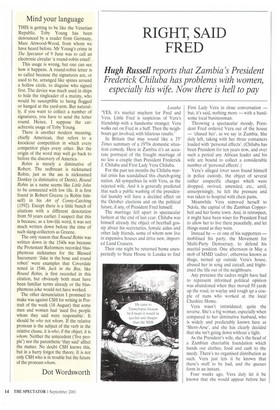Mind your language
THIS is getting to be like the Venetian Republic. Toby Young has been denounced by a reader from Germany, Marc Attwood-Wood, from whom we have heard before. Mr Young's crime in The Spectator of 9 June was to call an electronic circular 'a round-robin email'.
This usage is wrong, but one can see how it happens. A round-robin letter is so called because the signatures are, or used to be, arranged like spines around a hollow circle, to disguise who signed first. The device was much used in ships to hide the ringleader of a mutiny, who would be susceptible to being flogged or hanged at the yard-arm. But naturally, if you want to collect a number of signatures, you have to send the letter round. Hence, I suppose the catachrestic usage of Toby Young.
There is another modern meaning, chiefly American, that refers to a knockout competition in which every competitor plays every other. But the origin of the word may well go back to before the discovery of America.
Robin is merely a diminutive of Robert. The redbreast is nicknamed Robin, just as the ass is nicknamed Donkey (a diminutive of Denis). Round Robin as a name seems like Little John to be connected with low life. It is first found in Robert Greene (a Robin himself) in his Art of Con ny-Catching (1592). Except there is a tittle bunch of citations with a different denotation from 50 years earlier. I suspect that this is because, as a low-life word, it was not much written down before the time of such slang-collectors as Greene.
The only reason that Round Robin was written down in the 1540s was because the Protestant Reformers recorded blasphemous nicknames for the Blessed Sacrament: 'Jake in the boxe and round roben' were examples that Coverdale noted in 1546. Jack in the Box, like Round Robin, is first recorded in this citation, but obviously both must have been familiar terms already or the blasphemous joke would not have worked.
The other denunciation I promised to make was against CSH for writing in Portrait of the week (18 August) that some men and women had 'sued five people whom they said were responsible'. It should be who not whom. If the relative pronoun is the subject of the verb in the relative clause, it is who; if the object, it is whom. Neither the antecedent (live people') nor the parenthetic 'they said' affect the matter. No doubt CSH knows this, but in a hurry forgot the theory. It is not only CSH who is in trouble but the future of the pronoun whom.
Dot Wordsworth


























































 Previous page
Previous page